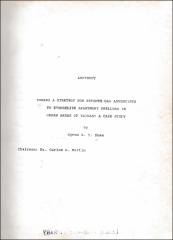| dc.description.abstract | The growing urbanization of Taiwan has created a need for new evangelization strategies that are fresh and relevant to the contemporary scene. This dissertation explores strategies for Seventh-day Adventists to evangelize Taiwan-Chinese apartment dwellers in their changing urban environment. The study begins with a presentation of the case taken from the urban Taipei church in Taiwan. The research process follows a four-part plan: (1) description, (2) analysis, (3) interpretation, and (4) pastoral action.
PART I : DESCRIPTION
To provide a clear background of the Taiwan-Chinese, the Taipei church, and the need for new avenues of outreach ministry, part I presents a description of the problem faced by the Taipei church. Chapter 1 presents the case of the Taipei church members who have failed to reach apartment dwellers by using traditional strategies. Chapter 2 introduces the statement of the problem, the purpose for the study, its significance, pastoral issues, delimitations, presuppositions, and the methodology used in the study of urban evangelization.
PART II : ANALYSIS
The analysis includes two chapters dealing with sociocultural and religious dynamics surrounding the Taiwan churches. The urban Taiwan-Chinese minds and needs are characterized by (1) relationships with fellow workers and club members; (2) nuclear family structures; (3) secular humanism; (4) religious freedom; (5) health, occupation, and education orientation; and (6) the new filial piety based on love and communication.
In present times, the main religions dominating the urban Taiwan-Chinese citizens’ spiritual affairs are Confucianism, Folk Taoism, Mahayana Buddhism, Fold Beliefs, Protestantism, and Catholicism. Confucianism emphasizes the importance of education and filial piety. When Confucianism met Buddhism, ancestral worship was established and continues in the present. In Folk Taoism, salvation is dependent on personal works and the grace of Bodhisattva.
The theological foundation of the role of the church in outreach portrays the church as the people of God. The role of church members is to serve as ministers and witnesses; the role of the pastor is as leader and equipper. Ellen White supports urban evangelization emphasizing that church members should ministers of God, and the pastor, a trainer and an education. Small groups can meet people’s needs wherever they are, preparing people for harvest through public evangelism. The life of a small group is strengthened by nurture, worship, community, and mission. Ellen White confirms that small-group strategy is God’s inspiration for the Christian church today.
PART IV: PASTORAL ACTION
A synthesis of the religious and sociocultural analysis and interpretation of Taiwan today, a summary of the results of the study, and a pastoral strategy and action plan comprise part IV, the final section of the study.
A new approach to reach apartment dwellers may include (1) improving the spiritual lives of church members, providing them training programs and offering them support systems; and (2) implementing five stages of small group strategy: contact, concern, confidence, call, and copy. Recommendations for Pastor A, for the Taipei Church, and for the SDA urban churches in Taiwan conclude the study. | en_US |

